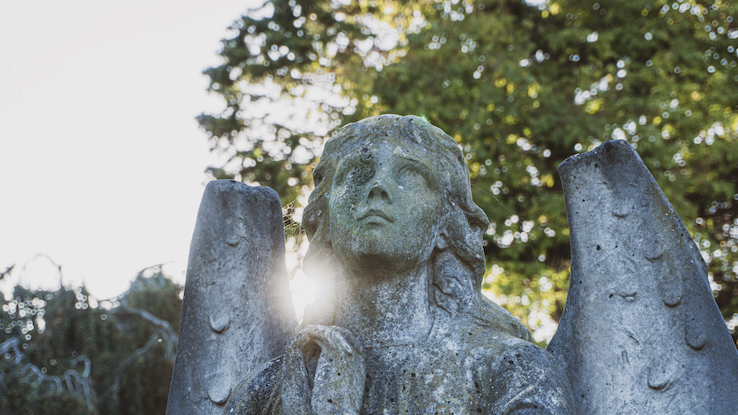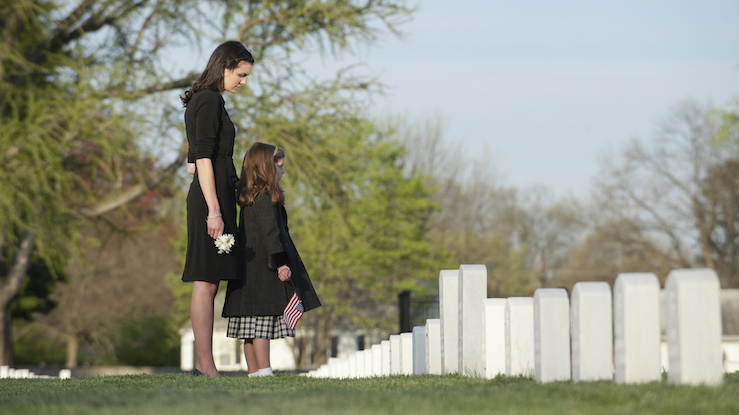Virtualbox Referenced Memory Could Not Be Read

When y'all lose a loved one, information technology's important to honor their retentiveness in a way that holds meaning for yous. Yous might choose to arrange a memorial service that displays your respect for their life, shows how much they meant to you and helps you and others process your grief in a purposeful way. Some people choose to write their own eulogies to read during the service, while others prefer to read a poignant poem that expresses their feelings in a heartfelt manner or that helps them find the words they're having difficulty carrying. If you're searching for a poem to read at your loved one's funeral, consider ane of these five thoughtful options, each penned past a well-known poet.
"Think" by Christina Rossetti
Born in London to an Italian poet in exile, Christina Rossetti wrote some of the most famous poems of the Victorian era. Many of her works focused on the topics of death and sadness, and one of her most notable works is "Call back," which is often read at funerals and memorial services. The poem gives vocalism to the person who has passed away and asks mourners to remember her fondly. However, it also gives the mourners permission to forget her in the future, as the author wants her loved ones to exist happy rather than wallow in sadness after her death.

An excerpt of this poem reads:
"Notwithstanding if yous should forget me for a while
And afterwards retrieve, do non grieve:
For if the darkness and corruption leave
A vestige of the thoughts that once I had,
Better by far you should forget and smile
Than that you should call up and be sad."
Notice the full version of "Recollect" here.
Robert Frost grew up in New England and wrote at length about the region. His almost famous works chronicle to nature, specifically man'southward relationship with nature and the pregnant of life. That sentiment is evident in "Nothing Gold Can Stay," which uses the life cycle of a blossom equally a metaphor for homo expiry. Frost'south theme is that cypher lasts forever, no matter how beautiful or "gold" it is. He compares decease to the ruin of the Garden of Eden and the ending of a mean solar day. At eight lines, the verse form is short, but information technology relays a bulletin of acceptance of expiry's inevitability and appreciate of life's dazzler.

An excerpt of this poem reads:
"So Eden sank to grief,
So dawn goes down to day.
Nil gold can stay."
Find the full version of "Nothing Gold Tin Stay" here.
"Crossing the Bar" by Alfred Lord Tennyson
Alfred Lord Tennyson was one of the most famous poets in the Victorian historic period. He grew up in a troubled household in England and ofttimes turned to his poetry as a way to escape his turbulent life. Throughout the years, he wrote eulogies in the form of poems for lost friends and family members. "Crossing the Bar" is a poem he wrote later the death of his son, Lionel, during a time that left the poet searching for the meaning of life through religion and spirituality. He wrote this particular poem while on a gunkhole, and it compares death to going out to sea. It also mentions meeting the "Pilot'southward" face after crossing the bar, which may be a metaphor for God or a college being.

An excerpt of this poem reads:
"Twilight and evening bell,
And subsequently that the dark!
And may there be no sadness of farewell,
When I embark;
For tho' from out our bourne of Time and Place
The inundation may bear me far,
I hope to run across my Airplane pilot face up to face
When I accept crost the bar."
Find the full version of "Crossing the Bar" here.
"Because I could not finish for Death (479)" past Emily Dickinson
Massachusetts native Emily Dickinson is perhaps ane of the most famous American poets in history, and her poem "Considering I could not stop for Death (479)" is one of her more notable works. Oftentimes read at funerals and memorial services, the poem depicts death as a visitor to the person's dwelling who takes the author abroad in a wagon. Death and the writer take a ride through boondocks, passing fields and schools before coming to a stop at her last destination. The verse form talks of the lord's day setting, a house that seems to be swelling from the footing and how eternity feels like only a day.

An extract of this poem reads:
"Because I could non stop for Death –
He kindly stopped for me –
The Railroad vehicle held but merely Ourselves –
And Immortality."
Find the full version of "Considering I could not terminate for Death" here.
"A Child Said, What Is the Grass?" by Walt Whitman
Walt Whitman grew up in Brooklyn and is also one of the most famous poets in the history of the U.S. Much of his work focuses on nature and love, and he manages to find beauty in near every situation, including death. That's the theme of the poem "A Child Said, What Is the Grass?" It begins with a immature child request the author "What is grass?" He goes on to recall about the various answers he can give the kid, but he'southward unhappy with all the answers. Finally, he wonders what has get of all the people who died in the past who are buried nether the grass, coming to the conclusion that the grass is proof they aren't really dead. The poem is a bit longer than the others on the list, just it has an uplifting message for mourners by pointing out that death is not an stop, but a transition to a new affiliate.

An excerpt of this poem reads:
"What exercise you lot think has become of the immature and erstwhile men?
And what do you retrieve has go of the women and children?
They are alive and well somewhere,
The smallest sprout shows in that location is really no death."
Find the full version of "A Child Said, What Is the Grass" hither.
Source: https://www.questionsanswered.net/lifestyle/5-poems-to-read-at-a-memorial-service?utm_content=params%3Ao%3D740012%26ad%3DdirN%26qo%3DserpIndex